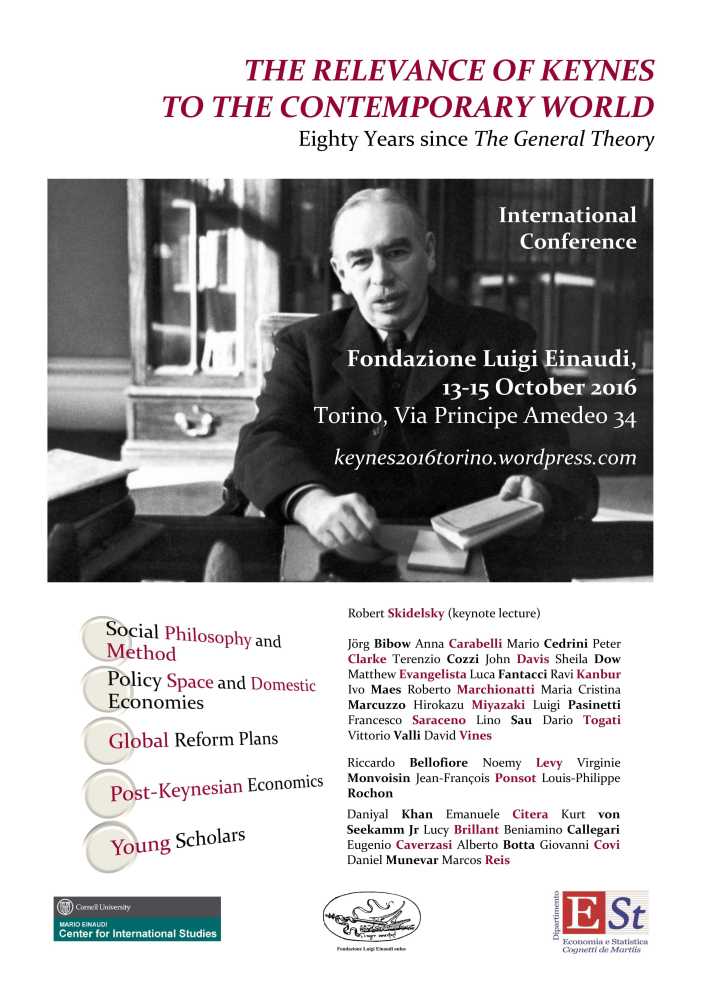“The Relevance of Keynes to the Contemporary World. Eighty Years since The General Theory”
 “The Relevance of Keynes to the Contemporary World. Eighty Years since The General Theory” (website: https://keynes2016torino.wordpress.com/) is an international conference taking place at the Fondazione Luigi Einaudi, Torino, Italy, on 13-15 October 2016.
“The Relevance of Keynes to the Contemporary World. Eighty Years since The General Theory” (website: https://keynes2016torino.wordpress.com/) is an international conference taking place at the Fondazione Luigi Einaudi, Torino, Italy, on 13-15 October 2016.
Renowned Keynes specialists from all over the world and young scholars will discuss the ongoing relevance of Keynes’s social philosophy and method, of his active defense of national policy space, as well as of his plans of global reform.
The conference is sponsored by the Mario Einaudi Center for International Studies, Cornell University, the Fondazione Luigi Einaudi, Torino, and the Department of Economics and Statistics “Cognetti de Martiis”, University of Torino.
Anyone interested is welcomed to attend this public event.
PROGRAM
THURSDAY, 13 OCTOBER
2 pm
Welcome Addresses
- Luigi R. Einaudi (American Academy of Diplomacy)
- Terenzio Cozzi (Fondazione Luigi Einaudi)
- Federico Revelli (Dip.to di Economia e Statistica “Cognetti de Martiis”)
2:30 pm
Invited Lecture
- Robert Skidelsky (University of Warwick)
What is Essential about Keynes?
3:30 pm
I. Keynes’s Social Philosophy and Method: A Political Vision and a Theoretical Approach for Analyzing “Problems of Organic Unity”
Chair: Robert Skidelsky (University of Warwick)
- John Davis (Marquette University and University of Amsterdam)
The Continuing Relevance of Keynes’s Philosophical Thinking: Uncertainty, Complexity, Reflexivity - Sheila Dow (University of Stirling and University of Victoria in Canada)
Keynes’s Social Philosophy and Method applied to Monetary Reform - Roberto Marchionatti, Mario Cedrini (University of Torino)
The Modernity of an Un-Modern Economist - Ravi Kanbur (Cornell University)The End of Laissez-Faire, the End of History, and the Structure of Scientific Revolutions
Discussant: Anna Carabelli (University of Piemonte Orientale)
FRIDAY, 14 OCTOBER
9:15 am
II. In Defense of “Policy Space”: Keynes and the Management of Domestic Economies
Chair: David Vines (University of Oxford)
- Peter Clarke (University of Cambridge)
Rules and Discretion in the Making of Economic Policy - Francesco Saraceno (OFCE SciencesPo, Paris)
When Keynes Goes to Brussels: A Fiscal Rule for the EMU. Is It Desirable? - Vittorio Valli (University of Torino)
Economic Policies during the ‘Great Recession’ in Italy and in the United States: A Comparative and Critical View
Discussant: Ivo Maes (National Bank of Belgium)
2:15 pm
III. Keynes’s Global Reform Plans: Suggestions for a New International Economic Order
Chair: Peter Clarke (University of Cambridge)
- David Vines (University of Oxford)
What Keynes Actually Did in the Run-up of Bretton Woods and the Relevance of His Action - Jörg Bibow (Levy Economics Institute of Bard College, NY)
Symmetric Global Order with National Self-determination and No Hegemon: Vision and Reality - Luca Fantacci (Bocconi University)
Reconciling Money and Goods: The Complementarity between Keynes’s Commodity and Currency Plans for the Postwar World
Discussant: Maria Cristina Marcuzzo (Università di Roma La Sapienza)
5 pm
IV. Final Considerations
- Peter Clarke (University of Cambridge)
- Hirokazu Miyazaki (Mario Einaudi Center for International Studies, Cornell University)
SATURDAY, 15 OCTOBER
9:15 am
Special session: Young Scholars
Chair: Matthew Evangelista (Cornell University)
- Daniyal Khan (Beaconhouse National University, Lahore)
Reading the General Theory as Economic Sociology: A Broader Interpretation of an Economic Classic - Emanuele Citera (University of Torino)
A Simple Language for a Complex World: Keynesian Foundations of Complexity Economics - Kurt von Seekamm Jr. (Salem State University, Massachussets)
A Modern Interpretation of Keynes’ Analysis of Speculation in the Professional Financial Markets and the Impact of the Allocation of Talent - Lucy Brillant (University of Burgundy)
Limits of Arbitrage and Interest Rates: A Debate Between Keynes, Hawtrey and Hicks - Beniamino Callegari (BI Norwegian Business School)
From Euthanasia to Dominance and Back Again: The Central Role of Banking in Creating and Destroying Financialization - Eugenio Caverzasi (Marche Polytechnic University), Alberto Botta (University of Greenwhich)
Shadow Banking and the Endogeneity of Money - Giovanni Covi (University of Verona)
The Euro Area: Trade Imbalances and Growth Differentials. A Minsky-Kaleckian SVAR Approach - Daniel Munevar (University of Texas), Marcos Reis (University of Rio de Janeiro)
The SUCRE: An Expanded Bancor for Latin America?
Discussants: Terenzio Cozzi (Fondazione Luigi Einaudi), John B. Davis (Marquette University and University of Amsterdam), and Dario Togati (University of Torino)
2:30 pm
Special session: Post-Keynesian Economics and Keynes
Chair: Luigi Pasinetti (Catholic University of Milan)
- Riccardo Bellofiore (University of Bergamo)
Keynes within the ‘Hidden Marxian Stream’ in the 20th Century Political Economy: The Discussion on Keynes in Early Italian Circuitism - Noemi Levy (National Autonomous University of Mexico (UNAM)
The Monetary Circuit in Keynes and Circuitists and Issues of Development - Virginie Monvoisin (Grenoble Ecole de Management)
Keynes and Monetary Circuit: A Contemporary Approach for a Contemporary Context - Jean-François Ponsot (University of Grenoble Alpes)
Keynes and the Keynesian Revolution in France, 1936-1960 - Louis-Philippe Rochon (Laurentian University)
How Post-Keynesian is Keynes on Endogenous Money?
Discussants: Sheila Dow (University of Stirling and University of Victoria in Canada) and Lino Sau (University of Torino)

Leave a Reply
You must be logged in to post a comment.